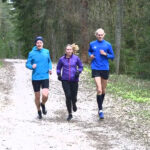To be successful in a triathlon, heptathlon or decathlon, you need to be proficient in several sporting disciplines. Each of these events includes running, and the level of ability that can be demonstrated isn’t to be underrated if you want to be the overall winner. A look at these events shows just why running is so important to a competitor’s chances of winning – and why runners can be so hard on themselves.
Triathlon
This event has become increasingly popular in recent years. In the UK that’s got a lot to do with the Olympic success enjoyed by the Brownlee brothers. A triathlon consists of swimming, cycling and running. Lengths for each discipline vary, but the basic ones are 1.5km for swimming, a 40km cycle ride and 10km run.
This event differs from the heptathlon and decathlon because the winner is the first to cross the finishing line. The other sports award points based on your performance in each discipline with the overall points determining the final result.
With the run being the final event in the triathlon, this is where the overall event can be won or lost. The swimming and cycling are of course important, but a poor performance in the run isn’t going to see you in contention to be the winner.
Those competitors who are strongest in the running part of this event will aim to stay in contention after the first two disciplines, and anyone betting on the outcome will study participants’ running form in relevant athletics events.
Women’s Heptathlon
The Women’s heptathlon sees competitors taking part in seven different events. It was introduced into the Olympics in 1984. This comprises of a 100m hurdles race, high jump, shot put, 200m sprint, long jump, javelin throw and finally an 800m run.
You can see, therefore, that the event includes three track sections. Points are awarded on individual performance based on a calculation made by the mathematician Dr Karl Ulbrich. Just exactly how that works makes cricket’s Duckworth/Lewis calculation look simple.
Not being a good runner is going to make it difficult for you to be the winner. For example, in the 200m, a time of 23.8 seconds will earn you 1000 points and compared to a runner who records a time of 27.14 seconds, there’s a 300-point difference.
With the first event involving running, those who specialize at this can set a fast time and get off to a great start. The 800m run is the final event in the Women’s Heptathlon. In a close competition, this means it can decide who the overall winner will be.
It’s also significant that the first day ends with the 200m and the second day with the 800m. Those races are run after a tiring day so those who record the best times can gain sizeable advantages over tired opponents who don’t list running as their strong point.
Former Olympic champion Nataliya Dobrynska was a strong runner, and the importance of the 800m was shown in the 2010 European Championships. She put herself in with a great chance of winning the title with a personal best in the 800m. However, Britain’s Jessica Ennis also recorded a personal best to win the title.
Men’s Heptathlon
This is an indoor event, and again it concludes with a 1000m run. This follows the 60m, long jump, shot put, high jump, 60m hurdles and pole vault.Again, don’t underestimate running in this event. Three of the seven events involve running, including the first when competitors are at their freshest, and the final one.
Decathlon
This time there are ten events to compete in. Day one comprises of the 100m, long jump, shot put, high jump and 400m. An athlete who is strong at running events will be out to record fast times in the first and last events of the day – just see how Ashton Eaton won Olympic Gold in 2016.
The second and final day consists of the 110m hurdles, discus throw, pole vault, javelin throw and 1500m. After a night’s rest, competitors will want to get off to a strong start in the 110m hurdles. Again, the overall result may be in doubt going into the final event, and those strong at the 1500m have the chance to earn a high points total.



































